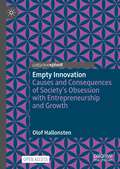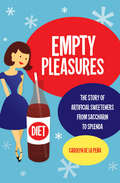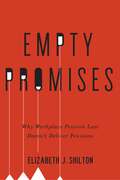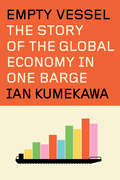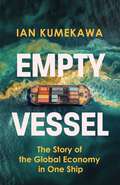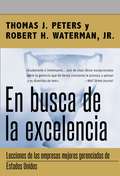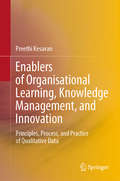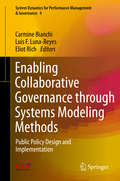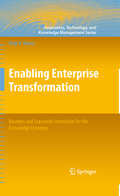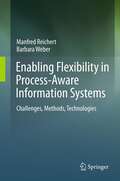- Table View
- List View
Empty Innovation: Causes and Consequences of Society's Obsession with Entrepreneurship and Growth
by Olof HallonstenInnovation is generally viewed as something inherently good, a source of progress and prosperity in our society. But innovation can also have negative, unintended, and wasteful effects, if policies are misdirected and organizations pursue innovation to look good and convey a message, rather than to actually achieve improvements of technologies, services, and products. This book makes the case that innovation has become a buzzword, a political cure-all, and increasingly an empty phrase, and that this has become detrimental to innovation itself.Governmental (and supra-governmental) innovation policy is often unrealistically phrased and shaped, and corporate innovation projects are not seldom meaningless acts of window-dressing. The book describes the problems this presents for society, organizations, and individuals, and seeks explanations for why it has come to be this way. Giving way to a more realistic view of what innovation really is, and how it can be accomplished, the book develops a multifaceted sociological and historical argument where several complementary reasons for the prevalence of “empty innovation” are proposed. The book will be of great interest to scholars and students of innovation, entrepreneurship, sustainability, and all those with an interest in the failures of current innovation strategies.This is an open access book.
Empty Labor
by Roland PaulsenWhile most people work ever-longer hours, international statistics suggest that the average time spent on non-work activities per employee is around two hours a day. How is this possible, and what are the reasons behind employees withdrawing from work? In this thought-provoking book, Roland Paulsen examines organizational misbehavior, specifically the phenomenon of 'empty labor', defined as the time during which employees engage in private activities during the working day. This study explores a variety of explanations, from under-employment to workplace resistance. Building on a rich selection of interview material and extensive empirical research, it uses both qualitative and quantitative data to present a concrete analysis of the different ways empty labor unfolds in the modern workplace. This book offers new perspectives on subjectivity, rationality and work simulation and will be of particular interest to academic researchers and graduate students in organizational sociology, organization studies, and human resource management.
Empty Pleasures: The Story of Artificial Sweeteners from Saccharin to Splenda
by Carolyn De La PeñaSugar substitutes have been a part of American life since saccharin was introduced at the 1893 World's Fair. In Empty Pleasures, the first history of artificial sweeteners in the United States, Carolyn de la PeÑa blends popular culture with business and women's history, examining the invention, production, marketing, regulation, and consumption of sugar substitutes such as saccharin, Sucaryl, NutraSweet, and Splenda. She describes how saccharin, an accidental laboratory by-product, was transformed from a perceived adulterant into a healthy ingredient. As food producers and pharmaceutical companies worked together to create diet products, savvy women's magazine writers and editors promoted artificially sweetened foods as ideal, modern weight-loss aids, and early diet-plan entrepreneurs built menus and fortunes around pleasurable dieting made possible by artificial sweeteners. NutraSweet, Splenda, and their predecessors have enjoyed enormous success by promising that Americans, especially women, can "have their cake and eat it too," but Empty Pleasures argues that these "sweet cheats" have fostered troubling and unsustainable eating habits and that the promises of artificial sweeteners are ultimately too good to be true.
Empty Promises: Why Workplace Pension Law Doesn’t Deliver Pensions
by Elizabeth J. ShiltonWorkplace pensions are a vital part of Canada's retirement income system, but these plans have reached a state of crisis as a result of their low coverage and inadequate, insecure, and unequally distributed benefits. Reviewing pension plans through a legal and historical lens, Empty Promises reveals the paradoxical effects and inevitable failure of a pension system built on the interests of employers rather than employees. Elizabeth Shilton examines the evolution of pension law in Canada from the 1870s to the early twenty-first century, highlighting the foreseeably futile struggle of legislators to create and sustain employees' pension rights without undermining employers' incentives. The current system gives employers considerable discretion and control in pension design and administration. Shilton appeals for a model that is not hostage to business interests. She recommends replacing today's employer-controlled systems with pensions shaped by the public interest, expanding mandatory broad-based or state-pension systems such as the Canada Pension Plan to generate pensions that respond to the changing workplace and address the needs and interests of retirees. Engaging with the long-running debate on whether Canadians should look to government or to the private sector for retirement income security, Empty Promises is a crucial work concerned with the future of the Canadian retirement system.
Empty Promises: Why Workplace Pension Law Doesn’t Deliver Pensions
by Elizabeth ShiltonWhy a voluntary, employer-based pension system does not deliver adequate and secure retirement income for most Canadians.
Empty Vessel: The Story of the Global Economy in One Barge
by Ian KumekawaThe rise of globalization and financialization as seen from a barge—one Swedish barge, to be exact, built in 1979 "The many-headed hydra of neoliberalism has found its chronicler." —Sven Beckert, author of Empire of Cotton"I&’ve rarely read a book that so deftly entwines a single, accessible story with the broad forces of globalization. A stunningly original history." —Maya Jasanoff, author of The Dawn WatchWhat do a barracks for British troops in the Falklands War, a floating jail off the Bronx, and temporary housing for VW factory workers in Germany have in common? The Balder Scapa: a single barge that served all three roles. Though the name would eventually change to Finnboda 12. And then to Safe Esperia. And later on, to the Bibby Resolution. And after that . . . in short, a vessel with so many names, and so many fates, that to keep it in our sights—as the protagonist of this fascinating economic parable—Ian Kumekawa has no choice but to call it, simply, the Vessel. Despite its sturdy steel structure, weighing 9,500 deadweight tons, the Vessel is a figure as elusive and abstract as the offshore market it comes to embody: a world of island tax havens, exploited labor forces, free banking zones, Thatcherism, Reaganomics, and mass incarceration, where even the prisoners are held offshore. Fitted with modular shipping containers, themselves the product of standardized global trade, the ship could become whatever the market demanded. Whether caught in an international dispute involving Hong Kong, Nigeria, Indonesia, and the Virgin Islands—to be settled in an English court of law—or flying yet another foreign &“flag of convenience&” to mask its ownership—the barge is ever a container for forces much larger than even its hulking self. Empty Vessel is a jaw-dropping microhistory that speaks volumes about the global economy as a whole. In following the Vessel—and its Sister Vessel, built alongside it in Stockholm—from one thankless task to the next, Kumekawa connects the dots of a neoliberal world order in the making, where regulation is for suckers and &“Made in USA&” feels almost quaint.
Empty Vessel: The Story of the Global Economy in One Ship
by Ian Kumekawa'Thrilling, meticulous and wondrously original' PHILIPPE SANDSA jaw-dropping microhistory of the global economy over the last fifty years told through the many lives of a single ship.At 94 meters long and 9,500 deadweight tonnes, once called the Bibby Resolution, is an unremarkable hulk, crossing the oceans unnoticed. And yet, the astonishing journey of this boat can tell us the story of the modern world.First built as a Swedish offshore oil rig in the 1970s, it went on to become a barracks for British soldiers in the Falklands War in the 1980s, a jail off New York in the 1990s, a prison in Portland in the 2000s, and accommodation for Nigerian oil workers off the coast of Africa in the 2010s. It has been called Safe Esperia, HMP The Weare, even 'The Love Boat'. In each of its lives this empty vessel has been commanded by economic forces much larger than itself: private investment, war, mass incarceration, imperial interests, national sovereignty, inflation, booms, busts and greed.Through its encounters with a world of island tax havens, the English court system, exploited labour forces, free banking zones or immigration politics, the ordinary boat at the heart of this story reveals our complex modern economy to us, connecting the dots of a dramatically changing world in the making, and warning us of its dangerous consequences.
Empty Vessel: The Story of the Global Economy in One Ship
by Ian Kumekawa'Thrilling, meticulous and wondrously original' PHILIPPE SANDSA jaw-dropping microhistory of the global economy over the last fifty years told through the many lives of a single ship.At 94 meters long and 9,500 deadweight tonnes, once called the Bibby Resolution, is an unremarkable hulk, crossing the oceans unnoticed. And yet, the astonishing journey of this boat can tell us the story of the modern world.First built as a Swedish offshore oil rig in the 1970s, it went on to become a barracks for British soldiers in the Falklands War in the 1980s, a jail off New York in the 1990s, a prison in Portland in the 2000s, and accommodation for Nigerian oil workers off the coast of Africa in the 2010s. It has been called Safe Esperia, HMP The Weare, even 'The Love Boat'. In each of its lives this empty vessel has been commanded by economic forces much larger than itself: private investment, war, mass incarceration, imperial interests, national sovereignty, inflation, booms, busts and greed.Through its encounters with a world of island tax havens, the English court system, exploited labour forces, free banking zones or immigration politics, the ordinary boat at the heart of this story reveals our complex modern economy to us, connecting the dots of a dramatically changing world in the making, and warning us of its dangerous consequences.
En Perspectiva. 25 años y más.
by Carina Novarese Emiliano CoteloTodas las mañanas desde hace un cuarto de siglo, Emiliano Cotelo y suequipo acompañan a los uruguayos con su programa En Perspectiva, deradio El Espectador. Este nuevo libro del sello Aguilar celebra los 25años de este reconocido periodístico. Un cuarto de siglo atrás Uruguay nació nuevamente a la democracia. Hacíafalta una mirada fresca y rigurosa sobre todo ese proceso que comenzabaa desatarse. En Perspectiva surgió en ese entorno y, desde entonces, haacompañado cada día de los uruguayos a través de las voces de EmilianoCotelo y su equipo. Hay mucho para contar. Desde los comienzos enEmisora del Palacio hasta su instalación definitiva en radio ElEspectador. Es que por esos micrófonos desfilaron los protagonistas yacontecimientos claves de la historia reciente nacional. A través decartas, llamadas, mensajes de texto y de correo electrónico, en muchoscasos, el personaje principal fue la audiencia. O un presidente de laRepública. O un premio Nobel. O un artista reconocido. Lo que se ve y loque no se ve, lo que se escucha y lo que no se escucha del proceso de ?hacer radio? es un capítulo apasionante de este libro. ¿Cómo se hacepara saludar con tanto entusiasmo a las 7:00 de la mañana? ¿Cuál es ladinámica de trabajo que permite manejar todos los datos de la realidadnacional e internacional con tanta soltura? ¿Cuáles fueron las mejoresentrevistas? ¿Cómo se mantiene la independencia periodística en un medioque depende de los anunciantes para sobrevivir? ¿Cómo se maneja larelación con los representantes del poder político? Las respuestasvienen de la mano de Emiliano Cotelo y Carina Novarese para celebrarestos 25 años y más de En Perspectiva.
En busca de la Sexcelencia (En Progreso)
by J. M. AnglerUna manera insólita de hacer negocios, desde el lado positivo, humorístico y paródico del erotismo. Una velada sátira a los libros de autoayuda. El autor juega a establecer paralelismos divertidísimos entre los negocios y el erotismo. Real como la vida misma. La venta es un complejo arte exactamente igual al arte de amar. Sin complejos, llamando a cada cosa por su nombre, el autor aconseja detalladamente cómo conquistar al cliente, cómo seducirlo y cómo consumar el acto carnal en el que la pluma que firma un contrato es una metáfora del sexo. Tras los secretos del arte de hacer el amor con los clientes conquistados, el autor acude a la gestión interna de las empresas: los equipos, las fidelidades la necesidad de que fluya a erótica empresarial. Aparte de sabios consejos, se enseña cómo hacer un Plan de Marketing erótico-empresarial para alcanzar el pleno éxito. Todo ello con un lenguaje directo, claro, aunque sin ser ofensivo para el buen gusto. Con citas de autores, historias divertidas sobre chascos eróticos y ejemplos de la vida misma. Un libro para leer y para gozar, que saca del armario cosas que hemos pensado alguna vez pero que no nos atrevimos a darle categoría de teoría erótico-empresarial. Si quiere triunfar en los negocios, no hay que olvidar que en realidad estamos tratando de triunfar en el amor. Amor directo y a fondo, como nunca nadie se lo había dicho antes.
En busca de la excelencia
by Tom Peters Robert H. Waterman Jr.El «mejor libro de negocios de todos los tiempos» (Bloomsbury REINO UNIDO), este libro ha sido desde hace mucho tiempo obligatorio en la sala de juntas, la escuela de negocios y la mesa de noche. Basado en un estudio de cuarenta y tres de las empresas mejores administradas de Estados Unidos de una gran variedad de sectores empresariales, este libro describe ocho principios básicos de la gerencia, estimula a la acción, orientado a la gente, prácticas que maximizan los beneficios, que hicieron de estas companías organizaciones exitosas. Este fenomenal best seller dispone de una nueva Nota del autor, y retoma estos principios vitales de manera accesible y práctica para el lector gerencial actual.
En cien años todos muertos: Guía para emprender o morir... sin haberlo hecho
by Joan BoludaEl libro de referencia para los emprendedores. Una guía de supervivencia práctica y amena para emprendedores. Prepara el terreno, empieza a rodar y aborda con éxito el día a día de tu actividad profesional o empresarial. Si estás leyendo esto, quiere decir que dentro de cien años estarás muerto. La vida es terroríficamente corta y cualquier día pensarás: «¿Qué demonios he hecho con mi vida? ¿Por qué no he hecho lo que quería? ¿Por qué he abandonado mis sueños?». Ahora aún estás a tiempo de cambiar, de actuar y de hacer lo que quieres. ¡No esperes más! Si tu trabajo no te realiza, no te hace feliz y estás considerando montar tu propio negocio, pero no te atreves, tienes miedo o no sabes cómo, sigue leyendo. Y si conoces a alguien que esté en esa situación, invítale a leerlo. Le puede ser de mucha ayuda. Porque este es un libro para espíritus emprendedores, desde el autónomo hasta el empresario. Para todas aquellas personas que han sentido esa fuerza, ese «empuje» invisible que te lleva a emprender. Y Joan Boluda, con su amplia experiencia como emprendedor, formador y divulgador, aborda todas aquellas cuestiones que cualquier emprendedor debería saber para emprender sin morir en el intento. De una forma llana y simple desbroza el camino para preparar el terreno, empezar a rodar y abordar el día a día en cualquier negocio o actividad profesional que te propongas. El libro no contiene la fórmula mágica del éxito, ni es un método para triunfar. Pero te animará a emprender si eso es lo que te hace feliz. Te alertará de todo lo que te vas a encontrar si quieres emprender. Te enseñará los conceptos, técnicas y estrategias que mejor resultado dan, para que los conozcas y los apliques. Y te guiará de forma clara y amena para que sepas qué pasos dar cuando empieces esta aventura.
En la boca del lobo: La historia jamás contada del hombre que derrotó al cartel de Cali (Vintage Espanol Ser.)
by William C. Rempe¿Arriesgarías tu vida para salvar tu alma? La historia jamás contada del hombre que derrotó al cartel de Cali. Colombia, en los años noventa, era un país sumido en el caos con un gobierno débil que combatía a la guerrilla y a los narcotraficantes inmersos en una guerra liderada por Pablo Escobar y sus eternos rivales: los hermanos Rodríguez Orejuela, del cartel de Cali. Jorge Salcedo, ingeniero, oficial de la reserva del ejército, un hombre de negocios respetado, padre de familia, que despreciaba a Escobar, entró a formar parte del cartel de Cali para convertirse en el jefe de seguridad de uno de los capos. Salcedo pretendía ignorar la corrupción, la violencia y la brutalidad que lo rodeaba, y luchó por preservar su integridad con grandes dificultades, hasta que un día recibió una orden directa del padrino que no podía cumplir pero tampoco desobedecer. Salcedo comprendió entonces que suúnica salida era traicionar al sindicato del crimen más rico y poderoso de todos los tiempos, arriesgarlo todo e intentar derrotar a los de Cali en un juego a vida o muerte en el que eran muy pocas las posibilidades de ganar. William C. Rempel es el único reportero con acceso directo a Jorge Salcedo y a su historia. Salcedo vive escondido con su familia en algún lugar de Estados Unidos. Nadie, ni siquiera el autor, conoce su paradero. Reseñas:«Un thriller real de ritmo vertiginoso que acelera el corazón.»Kirkus Reviews «Bill Rempel se ha ganado la reputación de mejor reportero de investigación de América, y como los cronistas de antaño, consigue que la gente le cuente historias asombrosas que no revelaría a nadie más. En la boca del lobo pone de manifiesto la maestría de Rempel al desvelar con todo lujo de detalles los secretos de la sangrienta guerra de las drogas en Colombia a partir del testimonio directo de uno de sus principales protagonistas. Al final te das cuenta de que el mayor misterio es que Jorge Salcedo haya logrado sobrevivir el tiempo suficiente para poder contarle su vida a Rempel.»James Risen, autor de Estado de guerra «En este impactante y extraordinario trabajo de no ficción, William Rempel pone de manifiesto la importancia de los reportajes de investigación, logrando acceder a la persona que podría, y de hecho lo hizo, difundir los secretos que desmontaron un cartel tan poderoso como el de Cali. Rempel tiene una historia extraordinaria que contar. No solamente arrastra al lector al oscuro mundo de los carteles de drogas, sino que ofrece también el estudio fascinante de un personaje, un hombre que tendrá que responder a una pregunta terrible: ¿Debe arriesgar su vida para salvar su alma o mantener un pacto con el diablo?»David Grann, autor de La ciudad perdida de Z y El diablo y Sherlock Holmes
En marcha con Uber: On the Move with Uber
by Tom SleeLa verdad sobre cómo actúa e interviene Uber en nuestra sociedad. Que Uber no es una empresa de economía colaborativa es vox populi, pero lo que quizá no sabes es cómo afecta en tu ciudad que esa empresa no pague impuestos en ella, el precario trato que Uber le da a sus conductores y cómo les hace pagar por trabajar, o cómo pueden rastrear tus movimientos en los trayectos. Este breve ensayo sobre Uber nos muestra una realidad escondida tras los bajos precios y el marketing que hace que nos replanteemos si realmente merece la pena utilizar este servicio que si bien nos supone un precio menor como individuos también supone nos supone un coste mayor como sociedad.
En sus trece: Prensa que irrita al poder (2011-2018)
by César Hildebrandt"Porque el periodismo es eso: tensar la cuerda, retar, obtener, tras arduos trabajos, la enemistad de los que cortan el jamón, los muchachos del big money. A mí que no me vengan con prensa sedante, prensa láudano, chicharrón de prensa, mustios collados. Solo la prensa que irrita al poder se salva de envolver pescado." De los muchos textos escritos en estos años para el semanario que lleva mi nombre -groserías del márqueting, demandas de la subsistencia-, pocos son los que resultan legibles con el paso del tiempo. La mayor parte perece en la fugacidad, en el chisporreo grasiento de lo banal. Ahora los leo y me doy cuenta de cuánto reincido en temas y obsesiones. El menú de mi neurosis podría abreviarse de esta manera: me disgusta el mundo tanto como antes, cuando era joven y creía que lo cambiaríamos. Los consejos de la edad no me han servido de nada. Sigo siendo paciente de la ira y está intacto, más lozano si cabe, mi amor por las causas perdidas. Vivo en un país que amo y me abate al mismo tiempo, y he visto caer a casi todos los dioses que fueron el hechizo olimpo de mi juventud. Pero eso no me ha conducido a la melancolía, felizmente. Cada día estoy más convencido de que mi deber es pelear por lo que creo. ¿Creer? Sí, por qué no. No está mal creer que algún día el mundo será verde y que el Perú admitirá el placer de la civilización. No está mal creer que el mundo se deshará de los políticos y reconocerá, a la fuerza, que el planeta merece mejores guías y más ciertos discursos. En el fondo, esa es la pelea. Contra lo que muchos creen, no venero el pesimismo. Admito que el Perú alienta todas las tristezas y los desalientos, pero jamás me entregué al lujo de los años sabáticos y las treguas clínicas. La peor desgracia del Perú son sus políticos. Y eso es algo que hemos permitido los peruanos. No fue el imperialismo el que nos impuso a Fujimori ni vinieron de fuera los alisios viciosos que nos han hecho renunciar, tantas veces, a la dignididad ciudadana. No es de extrañar que buena parte de de estos textos estén dirigidos al denuesto altisonante de quienes asumieron el poder y nos defraudaron. César Hildebrandt
EnClean: Malcolm Waddell's Story (A)
by Elizabeth Johnson David J. CollisDescribes, in the words of its cofounder, the history of EnClean, an industrial and environmental services company, from its origins in 1984. The company grew rapidly and diversified into new businesses and new geographies both through acquisition and internally. It went public in 1989 but then suffered major losses in 1992 and 1993. The founder must now decide how to respond to a secret board ultimatum.
Enable Action: Removing Barriers to Implementing Change
by Dan S. CohenOnce you've given employees a reason to change, you must provide them with the means to make change happen. The purpose of this step in the change process is to enable a broad base of people to take action by removing as many barriers to the implementation of the change vision as possible. This chapter provides practical advice and assessment tools for removing the barriers that block action and encouraging people to take risks and be innovative.
Enablers of Organisational Learning, Knowledge Management, and Innovation: Principles, Process, and Practice of Qualitative Data
by Preethi KesavanThis book establishes constructivist, interpretivist, and linguistic approaches based on conventions about the nature of qualitative and text data, the author’s influence on text interpretation, and the validity checks used to justify text interpretations. Vast quantities of text and qualitative data in organizations often go unexplored. Text analytics outlined in this book allow readers to understand the process of converting unstructured text data into meaningful data for analysis in order to measure employee opinions, feedback, and reviews through sentiment analysis to support fact-based decision making. The methods involve using NVivo and RapidMiner software to perform lexical analysis, categorization, clustering, pattern recognition, tagging, annotation, memo creation, information extraction, association analysis, and visualization. The methodological approach in the book uses innovation theory as a sensitizing concept to lay the foundation for the analysis of research data, suggesting approaches for empirical exploration of organizational learning, knowledge management, and innovation practices amongst geographically dispersed individuals and team members. Based on data obtained from a private educational organization that has offices dispersed across Asia through focus group discussions and interviews on these topics, the author highlights the need for integrating organizational learning, knowledge management, and innovation to improve organizational performance, exploring perspectives on collective relationships and networks, organizational characteristics and structures, and tacit and overt values which influence such innovation initiatives. In the process, the author puts forward a new theory which is built on three themes: relationship and networks, knowledge sharing mechanisms, and the role of social cognitive schema that facilitate emergent learning, knowledge management, and innovation.
Enabling Agri-entrepreneurship and Innovation
by Catherine Chan Brent Sipes Tina S. LeeAgricultural entrepreneurs in conflict and post-conflict regions face special challenges; not just everyday personal risks, but also the difficulties of building small businesses when real or threatened violence can disrupt business growth cycles and economic security. Alongside establishing secure institutions, building a secure economy is rightly seen as the best way for conflict-torn regions to establish a peaceful future. But current agricultural entrepreneurship training and development starts from an assumption of peace, meaning that it is not always fit for purpose. The result is sub-optimal program design and inefficient use of resources. A product of a collaboration of experts in the fields of agri-business, agricultural marketing, and international development, this book gives officials and agencies developing entrepreneurship programs the practical real-life examples they need. Key Features: #65533; Based on research by experienced field practitioners. #65533; Establishes best practice approaches for supporting agri-entrepreneurship in conflict regions. #65533; Range of global case studies to illustrate lessons learnt.
Enabling Business Strategy with IT at the World Bank
by F. Warren McfarlanWorld Bank IT provides services (communications, applications, video conferencing, knowledge sharing, distance learning, information sharing, client commerce, crisis management, etc.) on a global basis to the poorest countries in the globe via satellites. This case covers the bank's global business strategy transformation and the role that IT plays in enabling that vision. Covers strategy and implementation topics and conveys a sense of using IT to narrow the digital divide on a global scale while recapping the evolution of the bank's IT strategy and implementation from 1995 to 2003.
Enabling Collaborative Governance through Systems Modeling Methods: Public Policy Design and Implementation (System Dynamics for Performance Management & Governance #4)
by Luis F. Luna-Reyes Carmine Bianchi Eliot RichThis volume constitutes a first approximation for the use of systems approaches and dynamic performance management as tools for collaborative governance. The chapters examine models and simulations used in some specific systems approaches, which contribute to facilitating problem focus and collective understanding of collaborative governance, especially in the area of performance management. The explicit connection between resources and outcomes promoted by this view helps managers to understand better how to improve policy and to create positive outcomes that create public value.
Enabling Creative Chaos: The Organization Behind the Burning Man Event
by Katherine K. ChenThis book examines the Burning Man organization to show how we have the agency to mold organizational experiences more to our liking.
Enabling Enterprise Transformation
by Nagy K. HannaPrivate enterprises in advanced economies have been learning to use information and communication technology (ICT) to innovate and transform their processes, products, services and business models, significantly improving productivity and competitiveness. Moreover, the ICT industry itself has become a major source of job creation and a contributor to economic growth and business transformation. A key question today is whether and how developing countries can learn to benefit from the ICT revolution, and what roles the government and private sector can play. Already, a number of developing countries have been inspired by the example of India and China, and are now seeking to jump on the outsourcing bandwagon. Nevertheless, with few exceptions in the developing world, little attention has been paid by policymakers and practitioners to invest systematically and proactively in ICT-enabled growth, poverty reduction and grassroots innovation. Most communities and small and medium-sized enterprises in developing countries, for example, face multiple constraints to adopting and leveraging this general purpose technology, and lack the capabilities for maximizing its potential. In "Enabling Enterprise Transformation", Nagy Hanna draws on his rich experience of over 35 years at the World Bank and other aid agencies as a development strategist and ICT policy expert, the most current research, and best practices from around the world to provide practical tools for promoting economic and social transformation through ICT. He assesses various initiatives to develop and diffuse ICT, such as innovation funds, incubators, parks, public-private partnerships, and comprehensive promotion programs. He argues for the strategic options now open for developing countries to participate in ICT production, to deploy ICT to transform industries and services, and to leverage ICT as a new national infrastructure for improving the business environment and enhancing the competitiveness of the whole economy. The challenge for leaders in developing countries is to create such social and institutional dynamics for learning about ICT use and adaptation at many levels. Lessons gained so far from programs to build these social learning and innovation capabilities at the institutional and grassroots levels should be shared among developing countries, and a dialogue among business leaders, policymakers, development agencies, educational institutions, and the general citizenry must be advanced.
Enabling Environment
by Srinivasan SunderasanEnabling Environment is as real as it gets. The global commons are jointly owned and their inhabitants are jointly obligated to ensure their preservation. In the face of protracted negotiations, convoluted documentation, discord, and incessant bickering among scientists, activists, pressure groups of various hues, politicians and negotiators, very often the people on the ground are ignored or taken for granted. In the meantime, life meanders along. It is these 'everyday individuals' who make consumption-related choices on their lifestyles, travel or on preferring certain products or services over others. Enabling Environment puts the individual front and center. Ecosystem services need to be recognized, appropriately priced and the costs allocated to the agents concerned. Enabling Environment is about defining economic and non-economic incentive structures and utilizing them to arrive at pro-environmental outcomes. This collection of articles illustrates the use of existing social, economic and regulatory structures, and the financial architecture and instruments, suitably modified or extended, to help internalize the environmental externality.
Enabling Flexibility in Process-Aware Information Systems: Challenges, Methods, Technologies
by Barbara Weber Manfred ReichertIn today's dynamic business world, the success of a company increasingly depends on its ability to react to changes in its environment in a quick and flexible way. Companies have therefore identified process agility as a competitive advantage to address business trends like increasing product and service variability or faster time to market, and to ensure business IT alignment. Along this trend, a new generation of information systems has emerged--so-called process-aware information systems (PAIS), like workflow management systems, case handling tools, and service orchestration engines. With this book, Reichert and Weber address these flexibility needs and provide an overview of PAIS with a strong focus on methods and technologies fostering flexibility for all phases of the process lifecycle (i.e., modeling, configuration, execution and evolution). Their presentation is divided into six parts. Part I starts with an introduction of fundamental PAIS concepts and establishes the context of process flexibility in the light of practical scenarios. Part II focuses on flexibility support for pre-specified processes, the currently predominant paradigm in the field of business process management (BPM). Part III details flexibility support for loosely specified processes, which only partially specify the process model at build-time, while decisions regarding the exact specification of certain model parts are deferred to the run-time. Part IV deals with user- and data-driven processes, which aim at a tight integration of processes and data, and hence enable an increased flexibility compared to traditional PAIS. Part V introduces existing technologies and systems for the realization of a flexible PAIS. Finally, Part VI summarizes the main ideas of this book and gives an outlook on advanced flexibility issues. The book's target groups include researchers, PhD students and Master students in the field of information systems. After reading the book, they will better understand PAIS flexibility aspects. To support the easy use as a textbook, a series of exercises is provided at the end of each chapter and slides and further teaching material are available on the book's web site www.flexible-processes.com. Professionals specializing in business process management (BPM) who want to obtain a good understanding of flexibility challenges in BPM and state-of-the-art solutions will also benefit from the presentations of open source as well as commercial process management systems and related practical scenarios.
